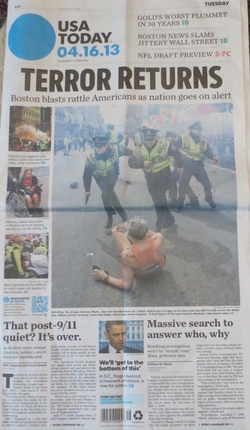 The inaccurate front page of "USA Today" on April 16, 2013, after the Boston Marathon bombing. |
Islamic inspiration often serves as the motivation of Muslim-on-infidel attacks around the globe, intending to advance the agenda of imposing Islamic law and Muslim supremacy. This goal motivates crimes as huge as genocide in Sudan and Iraq to those as minor as banning liquor in taxis or ham sandwiches on trolleys.
 The mug shot of Yusuf Ibrahim, accused of killing two Copts. |
Ignorance about motivation has several implications. First, while not every Muslim-on-non-Muslim attack is jihadi in nature, the obscurity of these offenses makes it hard to distinguish jihadi violence from violence which is criminal, familial, or just plain crazed.
Second, it means that Americans – including USA Today headline writers – barely know about the steady drumbeat of attacks, leaving them unaware about the scope of ideological Muslim-on-non-Muslim violence currently underway.
Third, ignorance prevents an accurate discernment of the jihad's methods, goals, and trends, impeding an informed, sensible response to it. It also means unawareness of important developments, such as ISIS' ability through mere exhortation – no money transfers or hierarchy needed – to inspire murders.
Finally, it permits American Islamists to deny that jihad has not reached the United States and to accuse anyone aware of this phenomenon to be prejudiced, even racist, thereby intimidating police departments, politicians, the press, and the professoriate from providing information.
An unprecedented wave of ideological violence has struck the United States since 1994, when PBS showed Steven Emerson's prize-winning documentary, Jihad in America. Despite the brutal and enduring nature of this low-intensity warfare, establishment institutions such as USA Today remain deeply unwilling to recognize it as a systematic and ideological assault, instead dismissing it as a vague form of unidentified extremism.
Denial will likely continue until the price gets too high. If 3,000 dead did not suffice to end American complacency, 30,000 dead or even 300,000 may not either. But three million certainly will. Should we not take steps to stop the carnage before it reaches such proportions?
Mr. Pipes (DanielPipes.org, @DanielPipes) is president of the Middle East Forum. © 2015 by Daniel Pipes. All rights reserved.
June 15, 2015 addenda: (1) This analysis builds an earlier article of mine, "Denying Islam's Role in Terror: Explaining the Denial," which focused on the reasons for denial. This new article considers the consequences of denial. Both follow on many previous articles railing against the neglect of jihadi violence. For a bibliography, click here.
(2) After so many acts of violence in the 9/11 spirit, what induced that headline writer to come up with the preposterously inaccurate "TERROR RETURNS"? Perhaps the Boston Marathon attack's special attributes combined to bring it to a different level of attention: its high-profile nature, the mystery of its perpetrators, the drama that played out over several days and included policemen and backyard boats, its causing a large city to shut down, and its reliance on an explosive device (rather than a knife, gun, or car attack). Whatever the reason, it was superficial and deceptive.